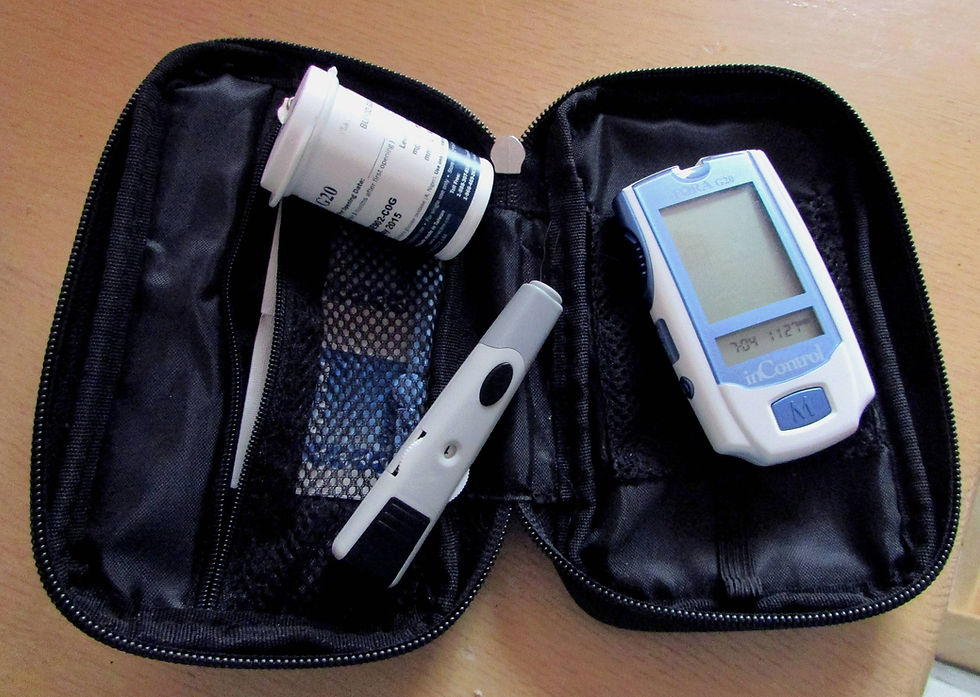Metabolic Syndrome: Understanding This Silent Threat
- Don
- Jan 13
- 3 min read
Metabolic syndrome is a cluster of conditions that occur together, increasing your risk of heart disease, stroke, and type 2 diabetes. These conditions include increased blood pressure, high blood sugar, excess body fat around the waist, and abnormal cholesterol or triglyceride levels.
Understanding the Components of Metabolic Syndrome
Central Obesity: This refers to excess body fat around the waist. Individuals with metabolic syndrome tend to carry more weight around their midsection ("apple-shaped" body), which is more closely linked to health risks than weight carried elsewhere.
Waist Circumference: Measurements vary slightly, but generally, a waist circumference greater than 40 inches for men and 35 inches for women is considered indicative of central obesity.
High Blood Pressure: Also known as hypertension, high blood pressure puts extra strain on your blood vessels and heart.
High Blood Sugar: This refers to elevated blood glucose levels, often a precursor to type 2 diabetes.
Abnormal Cholesterol Levels:
High Triglycerides: Triglycerides are a type of fat found in your blood. High levels can increase the risk of heart disease.
Low HDL Cholesterol: HDL cholesterol is often referred to as "good" cholesterol because it helps remove bad cholesterol from your bloodstream. Low levels of HDL cholesterol are a risk factor for heart disease.
Insulin Resistance: This is a key underlying factor in metabolic syndrome. Insulin is a hormone produced by the pancreas that helps regulate blood sugar levels. In insulin resistance, the body's cells become less responsive to insulin, leading to elevated blood sugar levels.
Why is Metabolic Syndrome a Concern?
Metabolic syndrome significantly increases the risk of developing serious health problems, including:
Heart Disease: This includes conditions such as heart attack and stroke.
Type 2 Diabetes: The risk of developing type 2 diabetes is significantly higher in individuals with metabolic syndrome.
Stroke: Metabolic syndrome increases the risk of stroke, which occurs when blood flow to the brain is interrupted.
Kidney Disease: Damage to the kidneys can occur as a complication of uncontrolled diabetes and high blood pressure.
Fatty Liver Disease: This condition occurs when excess fat accumulates in the liver.
Risk Factors for Metabolic Syndrome:
Overweight and Obesity: Carrying excess weight, particularly around the waist, is a major risk factor.
Physical Inactivity: Lack of regular physical activity increases the risk of developing metabolic syndrome.
Age: The risk of metabolic syndrome increases with age.
Family History: A family history of metabolic syndrome, type 2 diabetes, heart disease, or stroke increases your risk.
Ethnicity: Certain ethnicities, including Hispanic, African American, and Asian American individuals, may have a higher risk.
Hormonal Changes: Hormonal changes during pregnancy and menopause can increase the risk of metabolic syndrome.
Preventing and Reversing Metabolic Syndrome
Lifestyle Changes:
Weight Management:
Healthy Diet: Focus on a balanced diet rich in fruits, vegetables, whole grains, and lean protein.
Portion Control: Be mindful of portion sizes to avoid overeating.
Limit Processed Foods: Reduce consumption of processed foods, sugary drinks, and unhealthy fats.
Regular Exercise: Aim for at least 150 minutes of moderate-intensity aerobic activity or 75 minutes of vigorous-intensity aerobic activity per week.
Strength Training: Include strength training exercises 2-3 times per week to build muscle mass.
Medication: In some cases, medication may be necessary to manage conditions associated with metabolic syndrome, such as high blood pressure, high cholesterol, and high blood sugar.
Living with Metabolic Syndrome
If you have been diagnosed with metabolic syndrome, working closely with your healthcare provider is crucial. They can help you develop a personalized treatment plan that may include:
Dietary changes: Adopting a healthy eating plan.
Regular exercise: Incorporating physical activity into your daily routine.
Weight management: Strategies for achieving and maintaining a healthy weight.
Medications: If necessary, medications may be prescribed to manage blood pressure, cholesterol, and blood sugar levels.
Conclusion
Metabolic syndrome is a serious health condition that significantly increases the risk of heart disease, stroke, and type 2 diabetes. However, by making lifestyle changes, such as adopting a healthy diet, engaging in regular physical activity, and maintaining a healthy weight, you can significantly reduce your risk of developing or worsening metabolic syndrome. If you are concerned about your risk of metabolic syndrome, consult with your doctor for a comprehensive assessment and guidance on how to best manage your health.




Comments